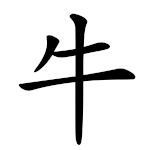Radical 93
 From Wikipedia the free encyclopedia
From Wikipedia the free encyclopedia
| 牛 | ||
|---|---|---|
| ||
| 牛 (U+725B) "cow" | ||
| Pronunciations | ||
| Pinyin: | niú | |
| Bopomofo: | ㄋㄧㄡˊ | |
| Gwoyeu Romatzyh: | niou | |
| Wade–Giles: | niu2 | |
| Cantonese Yale: | ngàuh | |
| Jyutping: | ngau4 | |
| Pe̍h-ōe-jī: | giû | |
| Japanese Kana: | ギュウ gyū / ゴ go (on'yomi) うし ushi (kun'yomi) | |
| Sino-Korean: | 우 u | |
| Names | ||
| Chinese name(s): | (牜) 牛字旁 niúzìpáng (Bottom) 牛字底 niúzìdǐ | |
| Japanese name(s): | 牛/うし ushi (牜) 牛偏/うしへん ushihen | |
| Hangul: | 소 so | |
| Stroke order animation | ||
 | ||

Radical 93 or radical cow (牛部) meaning "cow" or "bulls" is one of the 34 Kangxi radicals (214 radicals total) composed of 4 strokes.
When appearing at the left side of a Chinese character, it transforms into 牜, with the last two strokes switching their order and the last stroke becoming a rising stroke rather than a horizontal stroke.
In the Kangxi Dictionary, there are 233 characters (out of 49,030) to be found under this radical.
牛 is also the 79th indexing component in the Table of Indexing Chinese Character Components predominantly adopted by Simplified Chinese dictionaries published in mainland China, with 牜 being its associated indexing component.
Evolution
[edit]- Oracle bone script character
- Bronze script character
- Large seal script character
- Small seal script character
Derived characters
[edit]| Strokes | Characters |
|---|---|
| +0 | 牛 牜Component |
| +2 | 牝 牞 牟 |
| +3 | 牠 牡 牢 牣 牤 |
| +4 | 牥 牦SC (=氂 -> 毛) 牧 牨 物 牪 牫 牬 |
| +5 | 牭 牮 牯 牰 牱 牲 牳 牴 牵SC (=牽) |
| +6 | 牶 牷 牸 特 牺SC (=犧) |
| +7 | 牻 牼 牽 牾 牿 犁 |
| +8 | 犀 犂 (=犁) 犃 犄 犅 犆 犇 犈 犉 犊SC (=犢) 犋 |
| +9 | 犌 犍 犎 犏 犐 犑 |
| +10 | 犒 犓 犔 犕 犖 犗 |
| +11 | 犘 犙 犚 犛 犟TC variant |
| +12 | 犜 犝 犞 犟SC variant |
| +13 | 犠JP (=犧) |
| +15 | 犡 犢 犣 犤 犥 犦 |
| +16 | 犧 犨 |
| +18 | 犩 |
| +20 | 犪 |
| +23 | 犫 |
Sinogram
[edit]As an independent sinogram, 牛 is a Chinese character with the meaning "bull". In Japan, it is one of the Kyōiku kanji which is taught in the second grade of elementary school.[1]
References
[edit]- ^ "The Kyoiku Kanji (教育漢字) - Kanshudo". www.kanshudo.com. Archived from the original on March 24, 2022. Retrieved 2023-05-06.
Literature
[edit]- Fazzioli, Edoardo (1987). Chinese calligraphy : from pictograph to ideogram : the history of 214 essential Chinese/Japanese characters. calligraphy by Rebecca Hon Ko. New York: Abbeville Press. ISBN 0-89659-774-1.
- Lunde, Ken (Jan 5, 2009). "Appendix J: Japanese Character Sets" (PDF). CJKV Information Processing: Chinese, Japanese, Korean & Vietnamese Computing (Second ed.). Sebastopol, Calif.: O'Reilly Media. ISBN 978-0-596-51447-1.



